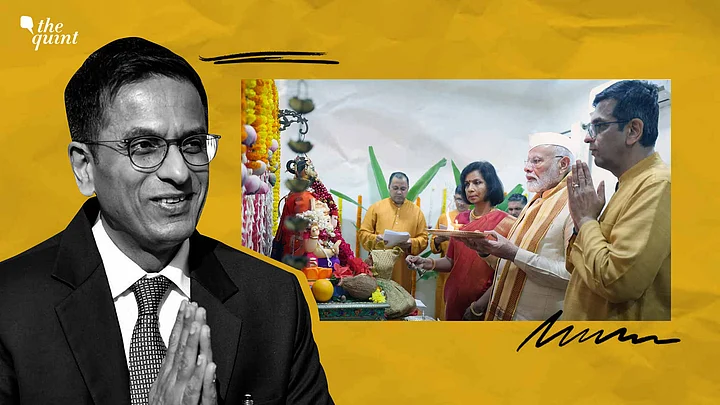Chief Justice of India DY Chandrachud and his wife Kalpana Das sparked quite a row on social media after they were seen welcoming PM Modi into their home with folded hands. Videos and pictures of the same were shared across social media platforms. PM Modi shared them too.
In another video, the PM is seen doing Ganesh Puja next to the CJI and his wife.
Article 50 of the Constitution of India, a directive principle of state policy, ensures the independence of our judiciary by holding an obligation over the state to separate the judiciary from the executive. It reads, "The State shall take steps to separate the judiciary from the executive in the public services of the State."
The Constitution also has several other implicit provisions for the separation of powers between the legislature, the executive, and the judiciary. The separation is not absolute and there are instances of overlap in certain functions to ensure checks and balances.
All these provisions collectively keep the judges at a reasonable distance from the executive, not only while discharging their duties but also in their personal lives.
Indian judges also have a tradition of keeping themselves at a distance from the officials of the executive and even political activists.
In the annals of the Indian judiciary, there are several instances where judges have openly shown their displeasure if an effort was made to bring them close to the executive or to the persons affiliated with it.
In the early fifties, when at a function, Prime Minister Nehru said that the executive and judiciary should work in harmony, Justice Patanjali Sastri got up then and there and said, "No Mr Nehru, our relationship is necessarily antagonistic."
This attitude was necessary not only to maintain the independence of the judiciary but also the faith of the common man in our justice system.
In the last few decades, this has changed. Now, a large number of leaders within the judiciary are missing the courage and the conviction, and we don't have any Nehrus nor Sastris either.
In earlier years, it was a usual practice to appoint retired as well as sitting judges as the head of the commissions. It was also a practice to appoint the chief justices of high courts as acting governors in the event of the non-availability of duly appointed governors.
These practices were discontinued only with a view to keep the judges immune from the executive's inductive effect. But practices like these have been reintroduced under several statutes by appointing retired judges as the heads and members of several commissions and tribunals.
This post-retirement engagement is causing serious injuries to the approach and attitude of our judges while in office.
The legislature must think about bringing necessary amendments to our Constitution to regulate post-retirement engagements. Otherwise, their activities will lead to an erosion of the faith of the people in our judicial system.
In light of these concerns, I believe that the visit by the prime minister to the residence of the CJI should not have taken place, and if, for any close intimacy it was necessary, then making it “public” was improper.
I don’t know who invited whom, but I can say that such visits may impact the image of the judiciary in the eyes of the public. The norm so far has been that the judiciary and the executive have maintained their distance on settled principles of independence.
The judiciary, led by the CJI, must do its part to keep it that way.
(Justice Govind Mathur is a former Chief Justice of the Allahabad High Court. This is an opinion piece and the views expressed are the author’s own. The Quint neither endorses nor is responsible for them. This piece has been edited for clarity and length.)
(At The Quint, we question everything. Play an active role in shaping our journalism by becoming a member today.)
